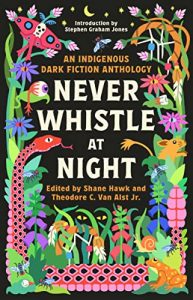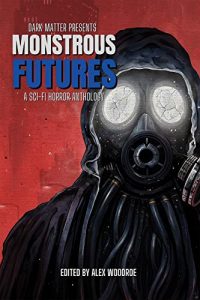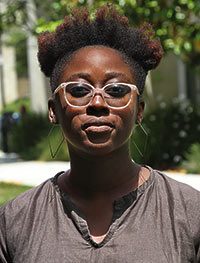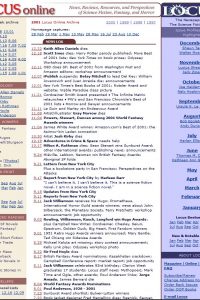The Year in Review 2023 by Arley Sorg
 2023 was a bummer: We published our final issue of Fantasy Magazine in October. All the same, it was a wonderful issue, and a strong way to go out. But there was no shortage of excellent short fiction to be found elsewhere. Besides the many intriguing magazines regularly putting out stories, there was a wealth of books that folks who love short fiction should consider picking up.
2023 was a bummer: We published our final issue of Fantasy Magazine in October. All the same, it was a wonderful issue, and a strong way to go out. But there was no shortage of excellent short fiction to be found elsewhere. Besides the many intriguing magazines regularly putting out stories, there was a wealth of books that folks who love short fiction should consider picking up.
My caveat: These entries inevitably leave out titles that deserve to be seen. Additionally, when we vote for ‘‘Best Novel’’ we are really saying, ‘‘This is the best novel among those I’ve actually read, not to mention actually remember, of the HUNDREDS of novels released, most of which I have not read…. ’’
I could write a different essay: ‘‘Books I Didn’t Get To, Which Are Likely VERY Good, And Which You Should Probably Buy!’’ Eden Royce’s collection Who Lost, I Found (Broken Eye) and Yvette Lisa Ndlovu’s collection Drinking from Graveyard Wells (University Press of Kentucky) would be at the top of this list. I wish I had read Blackened Roots edited by Nicole Givens Kurtz and Tonia Ransom (Mocha Memoirs). I was curious about Soul Jar, edited by Annie Carl (Forest Avenue) and found out way too late about Rosalind’s Siblings, edited by Bogi Takács (Atthis Arts).
I did end up reading a bunch of titles, though – in my new role as a literary agent at kt literary, as well as in my role as a reviewer for Lightspeed. My top two for 2023 (in a year of TONS of great books) include Never Whistle at Night: An Indigenous Dark Fiction Anthology edited by Shane Hawk and Theodore C. Van Alst Jr. (Vintage). Please stop what you’re doing and go get a copy. You can’t miss ‘‘Uncle Robert Rides the Lightning’’ by Kate Hart, which showcases superb storytelling; but this book is overflowing with marvelous fiction. Tied with this anthology is Infinite Constellations edited by Khadijah Queen and K. Ibura (University of Alabama Press) which, in my opinion, challenges the very ideas of what an anthology is and breaks through some of the assumptions and limitations of the form. There are so many powerful entries in this one, such as poems ‘‘She Sang to Me Once at a Place for Hunting Owls’’ by dg nanouk okpik and ‘‘Oskʌnu·tú’’ by Kenzi Allen.
 I highly recommend Suzan Palumbo’s collection Skin Thief (Neon Hemlock). Suzan is an excellent storyteller, and if you’re into things that lean a bit dark and literary, you are bound to love at least a few of these breathtaking tales. The Lies of the Ajungo by Moses Ose Utomi (Tordotcom Publishing) is a quick but terrific read at about 96 pages – inventive, thoughtful, and fun.
I highly recommend Suzan Palumbo’s collection Skin Thief (Neon Hemlock). Suzan is an excellent storyteller, and if you’re into things that lean a bit dark and literary, you are bound to love at least a few of these breathtaking tales. The Lies of the Ajungo by Moses Ose Utomi (Tordotcom Publishing) is a quick but terrific read at about 96 pages – inventive, thoughtful, and fun.
Our own Jonathan Strahan did fantastic work with The Book of Witches (Harper Voyager). It features a ridiculous amount of quality pieces, but I keep coming back to C.L. Clark’s ‘‘What Dreams May Come’’, which I found to be meaningful and memorable. Another Locus person, Paula Guran, put together a strong Year’s Best Fantasy, Volume 2 (Pyr). This is one of those books where you can open it randomly and find something well worth reading. ‘‘The Short History of My Mother’’ by Priya Sharma is absolutely engrossing, punctuated by the surreal and the magical.
Alex Woodroe edited Dark Matter Presents: Monstrous Futures (Dark Matter Ink), which proved to be a great anthology. M.H. Ayinde’s ‘‘Fully Comprehensive Code Switch’’ stood among the best in a book with lots of contenders. Nisi Shawl edited New Suns 2 (Solaris), with so many pieces that readers shouldn’t miss: Minsoo Kang’s ‘‘Before the Glory of Their Majesties’’, Nghi Vo’s ‘‘Silk and Cotton and Linen and Blood’’, Christopher Caldwell’s ‘‘Counting Her Petals’’ are a few outstanding examples.
 McSweeney’s 71: The Monstrous and the Terrible (McSweeney’s) edited by Brian Evenson really entertained me. In his introduction, Evenson says, ‘‘these are stories that try to provide the satisfactions of horror fiction and of ghost stories, while at the same time expanding the notion of what horror is and what it can do.’’ There are a lot of great stories here, but I’d single out ‘‘A Plague of Frogs’’ by Brandon Hobson as especially interesting. Unspeakable Horror 3: Dark Rainbow Rising edited by Vince A. Liaguno (Crystal Lake) was another strong anthology. Liaguno and Rena Mason edited Other Terrors: An Inclusive Anthology in 2022 for William Morrow and, like some titles mentioned above, I dropped the ball in terms of reading it. I was glad to see what Unspeakable had to offer. Let’s just say I hope to get to read more anthologies by Liaguno, and I’ll call out ‘‘Lavenders’’ by Yah Yah Scholfield for its beautiful storytelling – noting, again, that the book is chock-full of quality fiction.
McSweeney’s 71: The Monstrous and the Terrible (McSweeney’s) edited by Brian Evenson really entertained me. In his introduction, Evenson says, ‘‘these are stories that try to provide the satisfactions of horror fiction and of ghost stories, while at the same time expanding the notion of what horror is and what it can do.’’ There are a lot of great stories here, but I’d single out ‘‘A Plague of Frogs’’ by Brandon Hobson as especially interesting. Unspeakable Horror 3: Dark Rainbow Rising edited by Vince A. Liaguno (Crystal Lake) was another strong anthology. Liaguno and Rena Mason edited Other Terrors: An Inclusive Anthology in 2022 for William Morrow and, like some titles mentioned above, I dropped the ball in terms of reading it. I was glad to see what Unspeakable had to offer. Let’s just say I hope to get to read more anthologies by Liaguno, and I’ll call out ‘‘Lavenders’’ by Yah Yah Scholfield for its beautiful storytelling – noting, again, that the book is chock-full of quality fiction.
I was glad to get to edit Fantasy Magazine, and I am so happy that we got to showcase a lot of gorgeous works. I believe we were distinctive; we were even World Fantasy and Locus Awards finalists. But if I’m talking about short fiction in the field, I’d say that 2023 was abundant with first-rate short fiction. If you love short stories as much as I do, use this essay as a shopping list.
ARLEY SORG, Senior Editor, has been part of the Locus crew since 2014. Arley is an associate agent at kt literary. He is a 2022 Kate Wilhelm Solstice Award recipient and a 2023 Space Cowboy Award recipient. He is also a 2021 and 2022 World Fantasy Award finalist and a 2022 and 2023 Locus Award finalist for his work as co-Editor-in-Chief at Fantasy Magazine. Arley is a 2022 Ignyte Award finalist in two categories: for his work as a critic, and for his essay “What You Might Have Missed” in Uncanny Magazine. He is Associate Editor and reviewer at Lightspeed & Nightmare magazines, columnist for The Magazine of Fantasy and Science Fiction, and interviewer at Clarkesworld Magazine. He grew up in England, Hawaii, and Colorado, and lives in the SF Bay Area. A 2014 Odyssey Writing Workshop graduate, Arley has spoken at a range of events and taught for a number of programs, including guest critiquing for Odyssey and being the week five instructor for the six-week Clarion West workshop. He can be found at arleysorg.com – where he ran his own “casual interview” series with authors and editors – as well as Twitter (@arleysorg), Blue Sky, and Facebook.
This review and more like it in the February 2024 issue of Locus.
 While you are here, please take a moment to support Locus with a one-time or recurring donation. We rely on reader donations to keep the magazine and site going, and would like to keep the site paywall free, but WE NEED YOUR FINANCIAL SUPPORT to continue quality coverage of the science fiction and fantasy field.
While you are here, please take a moment to support Locus with a one-time or recurring donation. We rely on reader donations to keep the magazine and site going, and would like to keep the site paywall free, but WE NEED YOUR FINANCIAL SUPPORT to continue quality coverage of the science fiction and fantasy field.
©Locus Magazine. Copyrighted material may not be republished without permission of LSFF.








